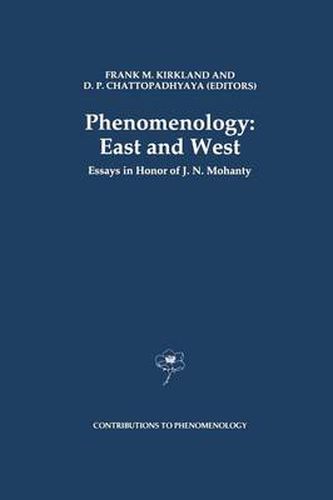Readings Newsletter
Become a Readings Member to make your shopping experience even easier.
Sign in or sign up for free!
You’re not far away from qualifying for FREE standard shipping within Australia
You’ve qualified for FREE standard shipping within Australia
The cart is loading…






This title is printed to order. This book may have been self-published. If so, we cannot guarantee the quality of the content. In the main most books will have gone through the editing process however some may not. We therefore suggest that you be aware of this before ordering this book. If in doubt check either the author or publisher’s details as we are unable to accept any returns unless they are faulty. Please contact us if you have any questions.
To know the work of Jitendra Nath Mohanty even slightly is to commence to appreciate it immensely. Lucidity and sagacity have been its armor; originality and ingenuity have been its strength. And wearing the former and wielding the latter have become so persistent a mark of his work as to suggest that their appeal for Mohanty lies altogether more in the refmed reaches of philosophical craftsmanship than on the coarse ground of intellectual partisanship. The multifaceted character of his work in phenomenology and Indian philosophy has never left us palled by its significance and, as a consequence, has always left us conceding its command on our philosophical discourse. It has fulfilled the most welcomed promise of striking the chords of both imagination and reason by exposing Husserlian phenomenology to the concerns of both the so-called analytical and continental traditions and by exposing the philosophical tradition of Indian thought to the intricacies of Husserl. Although charting and periodizing the body ofMohanty’ s work in phenomeno logy may be the function of a memory inconspicuous for originality and liveli ness, they nonetheless offer a precis conspicuous for the variety of topics that Mohanty has both engaged and enriched. Mohanty’s career in phenomenology can be characterized by three phases, each concentrating on different themes, but with the latter two also epitomizing a more incisive and deeper discussion of the issues raised in the first.
$9.00 standard shipping within Australia
FREE standard shipping within Australia for orders over $100.00
Express & International shipping calculated at checkout
This title is printed to order. This book may have been self-published. If so, we cannot guarantee the quality of the content. In the main most books will have gone through the editing process however some may not. We therefore suggest that you be aware of this before ordering this book. If in doubt check either the author or publisher’s details as we are unable to accept any returns unless they are faulty. Please contact us if you have any questions.
To know the work of Jitendra Nath Mohanty even slightly is to commence to appreciate it immensely. Lucidity and sagacity have been its armor; originality and ingenuity have been its strength. And wearing the former and wielding the latter have become so persistent a mark of his work as to suggest that their appeal for Mohanty lies altogether more in the refmed reaches of philosophical craftsmanship than on the coarse ground of intellectual partisanship. The multifaceted character of his work in phenomenology and Indian philosophy has never left us palled by its significance and, as a consequence, has always left us conceding its command on our philosophical discourse. It has fulfilled the most welcomed promise of striking the chords of both imagination and reason by exposing Husserlian phenomenology to the concerns of both the so-called analytical and continental traditions and by exposing the philosophical tradition of Indian thought to the intricacies of Husserl. Although charting and periodizing the body ofMohanty’ s work in phenomeno logy may be the function of a memory inconspicuous for originality and liveli ness, they nonetheless offer a precis conspicuous for the variety of topics that Mohanty has both engaged and enriched. Mohanty’s career in phenomenology can be characterized by three phases, each concentrating on different themes, but with the latter two also epitomizing a more incisive and deeper discussion of the issues raised in the first.